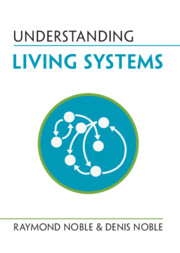Crossref Citations
This Book has been
cited by the following publications. This list is generated based on data provided by Crossref.
Vane-Wright, Richard I
and
Corning, Peter A
2023.
Teleonomy in living systems: an overview.
Biological Journal of the Linnean Society,
Vol. 139,
Issue. 4,
p.
341.
Avasiloaiei, Dan Ioan
Calara, Mariana
Brezeanu, Petre Marian
Gruda, Nazim S.
and
Brezeanu, Creola
2023.
The Evaluation of Carbon Farming Strategies in Organic Vegetable Cultivation.
Agronomy,
Vol. 13,
Issue. 9,
p.
2406.
Noble, Denis
2024.
It’s time to admit that genes are not the blueprint for life.
Nature,
Vol. 626,
Issue. 7998,
p.
254.
Noble, Denis
and
Joyner, Michael
2024.
The physiology of evolution.
The Journal of Physiology,
Vol. 602,
Issue. 11,
p.
2361.
Erita, Yeni
Miaz, Yalvema
Jupriani, Jupriani
Hevria, Silvi
and
Fauzi, Rosmadi
2024.
Using Virtual Reality to Enhance Twenty-First-Century Skills in Elementary School Students: A Systematic Literature Review.
Open Education Studies,
Vol. 6,
Issue. 1,
Rosslenbroich, Bernd
2024.
Evolutionary changes in the capacity for organismic autonomy.
The Journal of Physiology,
Vol. 602,
Issue. 11,
p.
2455.
Rosslenbroich, Bernd
Kümmell, Susanna
and
Bembé, Benjamin
2024.
Agency as an Inherent Property of Living Organisms.
Biological Theory,
Vol. 19,
Issue. 4,
p.
224.
Lee, YunHee
Mayer, Colin
Snower, Dennis
and
Noble, Denis
2024.
New lessons from biology for economics and business: a systems approach to non-market environments.
Journal of The Royal Society Interface,
Vol. 21,
Issue. 219,
Borzemska, Beata
Cięszczyk, Paweł
and
Żekanowski, Cezary
2024.
The Genetic Basis of Non-Contact Soft Tissue Injuries-Are There Practical Applications of Genetic Knowledge?.
Cells,
Vol. 13,
Issue. 22,
p.
1828.
Moroz, Leonid L.
and
Romanova, Daria Y.
2024.
Functional evolution and functional biodiversity: 150 years of déjà vu or new physiology of evolution?.
Frontiers in Cell and Developmental Biology,
Vol. 12,
Issue. ,
Onur, Ferhat
2024.
A Panpsychist Interpretation of Evolutionary Theory.
Hitit İlahiyat Dergisi,
Vol. 23,
Issue. 2,
p.
633.
Moore, David S.
and
Lewkowicz, David J.
2024.
How do babies come to know what babies know?.
Behavioral and Brain Sciences,
Vol. 47,
Issue. ,
Bayata, Adugna
and
Mulatu, Getachew
2024.
Carbon Farming, Climate Smart Agriculture Practice and Current Climate Change Mitigation Strategy- In the Case of Ethiopia
.
International Journal of Environmental Monitoring and Analysis,
Vol. 12,
Issue. 6,
p.
149.
Parker, Michael C.
Jeynes, Chris
and
Walker, Stuart D.
2025.
A Metric for the Entropic Purpose of a System.
Entropy,
Vol. 27,
Issue. 2,
p.
131.
Spreckelmeyer, S.
Dasilva, J.
Decristoforo, C.
Mach, R. H.
Passchier, J.
Carlucci, G.
Qhatani, M. Al
Duatti, A.
Cornelissen, B. T.
Engle, J.
Denkova, A.
Hendrikx, J. J. M. A.
Seimbille, Y.
Yang, X.
Jia, H.
Zhang, M-R.
Yang, M.
Perk, L.
Caravan, P.
Laverman, P.
Cheng, Z.
Hoehr, C.
Sakr, T.
and
Zeevaart, J. R.
2025.
Highlight selection of radiochemistry and radiopharmacy developments by editorial board.
EJNMMI Radiopharmacy and Chemistry,
Vol. 10,
Issue. 1,
Sadras, Victor O
Hayman, Peter T
and
Chenu, Karine
2025.
The causal arrows from genotype, environment, and management to plant phenotype are double headed.
Journal of Experimental Botany,
Vol. 76,
Issue. 4,
p.
917.
Segessenmann, Jan
Stadelmann, Thilo
Davison, Andrew
and
Dürr, Oliver
2025.
Assessing deep learning: a work program for the humanities in the age of artificial intelligence.
AI and Ethics,
Vol. 5,
Issue. 1,
p.
1.
Trewavas, Anthony
2025.
Plant intelligence dux: a comprehensive rebuttal of Kingsland and Taiz.
Protoplasma,
Vol. 262,
Issue. 2,
p.
255.



